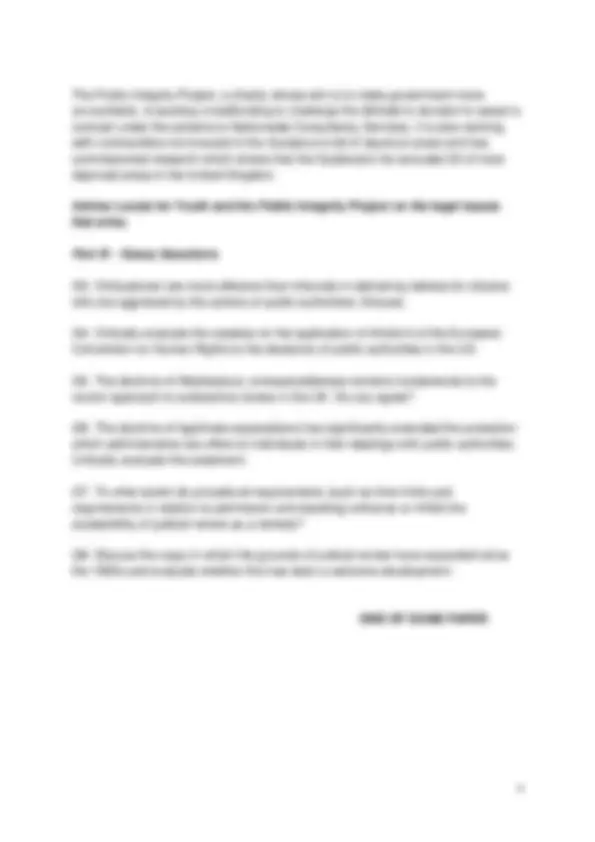



Study with the several resources on Docsity

Earn points by helping other students or get them with a premium plan


Prepare for your exams
Study with the several resources on Docsity

Earn points to download
Earn points by helping other students or get them with a premium plan
Community
Ask the community for help and clear up your study doubts
Discover the best universities in your country according to Docsity users
Free resources
Download our free guides on studying techniques, anxiety management strategies, and thesis advice from Docsity tutors
Two problem questions and two essay questions from an exam paper. The first problem question revolves around a student named amaya, who was suspended from beaconbrook academy for wearing a crucifix necklace against the school uniform and dress code policy. Amaya's parents lodged an appeal against the headteacher's decision, but the appeal was dismissed by the local authority. The second problem question pertains to the community development act 2022 and the allocation of funds to nationwide consultancy services and locals for youth. The essay questions cover topics such as the effectiveness of ombudsmen versus tribunals, the application of article 6 of the european convention on human rights, and the significance of various legal doctrines in administrative law.
What you will learn
Typology: Study Guides, Projects, Research
1 / 3

This page cannot be seen from the preview
Don't miss anything!


Part A – Problem Questions Q1. The (fictitious) Education Appeals (Scotland) Act 2022 (the Act) provides that Scottish local authorities "must make arrangements for receiving and hearing appeals against educational decisions taken by primary and secondary school headteachers". The Act includes a provision that "Scottish Ministers may make regulations in relation to the appeal procedure which local authorities must follow". The Education Appeals (Scotland) Regulations 2022 (the Regulations) state that "unless a procedural requirement is specified in these Regulations, local authorities shall determine their own appeal procedures." The Regulations set out two procedural requirements: appeals must be determined within 20 working days of having been intimated to the local authority; and, appeals must be heard by a panel which includes a parent representative and which is demonstrably independent of the local authority. Amaya is a student at Beaconbrook Academy (the Academy), who has been given a one week suspension from school due to repeated breaches of the Academy's School Uniform and Dress Code Policy (the Policy). The Policy provides that "students may not wear jewellery, including rings, bracelets, earrings, piercings and necklaces". Amaya was given repeated warnings that wearing a crucifix necklace was not allowed under the Policy, however, she refused to remove it. Following consultation with a priest at Amaya's local church, the Headteacher decided that Amaya was in breach of the policy and should be suspended. Amaya's parents lodge an appeal against the Headteacher's decision. The local authority convenes a panel composed of the Convener of the Local Authority's Education Committee, the Headteacher of a local secondary school, and a local primary school Headteacher whose children are currently in education. The appeal panel agrees to Amaya's parents' request for an oral hearing but tells them that they are not permitted to be legally represented. During a break in the proceedings, Amaya notices the Headteacher of Beaconbrook Academy sitting having coffee with members of the appeal panel. Four weeks from the date of the hearing, the Local Authority write to Amaya's parents in the following terms: "we regret to inform you that, following careful consideration, your appeal has been dismissed." Advise Amaya and her parents on the legal issues that arise. CONTINUED OVERLEAF
Q2. As part of the UK Government's levelling up agenda, the (fictitious) Community Development Act 2022 aims to empower local communities in deprived areas to develop their own solutions to local economic and social problems. Section 10 of the Act provides that the Minister of Housing, Communities, and Local Government (the Minister) "may create a scheme to provide funding for local community organisations in deprived areas to address pressing social and economic issues in their locality". The Act provides that "the Minister must publish guidance in relation to what shall constitute a deprived area and on the eligibility criteria for the scheme." When the Act was passed the Minister issued a press release stating that the Act would be “a game changer for grassroots organisations around the country that want to improve their local areas.” Under the Act, the Minister sets up a Community Development Fund and publishes the Community Development Fund Scheme Guidance (the Guidance). The Guidance defines "local community organisations" as "voluntary groups, grassroots associations, organisations or businesses whose focus is primarily on a particular locality and whose work includes tackling social or economic problems in that area." The Guidance includes a list of deprived areas, all of which are within constituencies represented by members of the governing party. The Guidance sets out the following criteria for assessing applications to the fund: applicants must have an annual turnover of over £500,000 per annum; applicants must have an established track record of enhancing economic development in a deprived locality; and applications must primarily focus on creating opportunities for developing new businesses in the local area. Nationwide Consultancy Services (NCS) is a large consultancy organisation that specialises in economic development. There have been rumours that family members of the Minister have a financial interest in NCS. NCS is awarded £5 million pounds under the scheme to deliver a range of business development projects across the country. Locals for Youth (LfY) is a small community group recently set up to reduce anti- social behaviour and engage young people in volunteering activities in one of the deprived areas listed in the Guidance. LfY applies to the Community Development Fund but is declined funding, on the basis that it does not meet the turnover criterion and its work does not relate to economic development or the development of new businesses. CONTINUED OVERLEAF